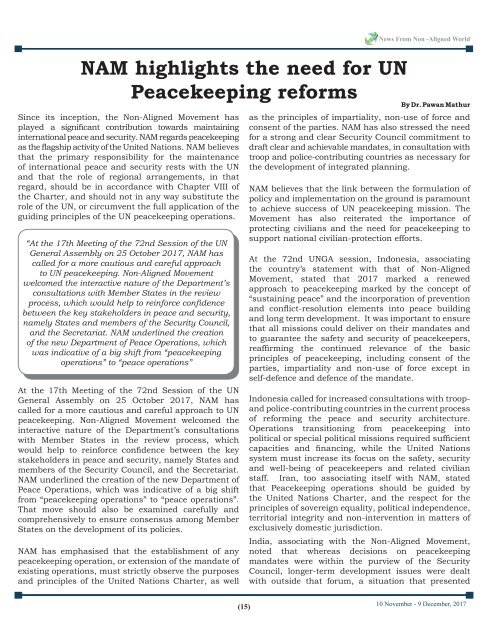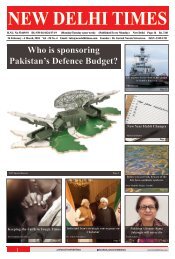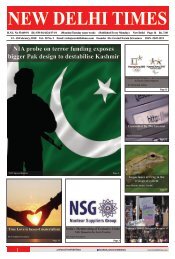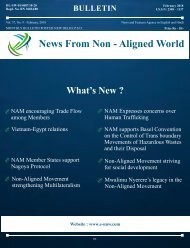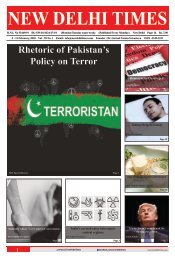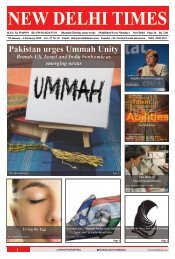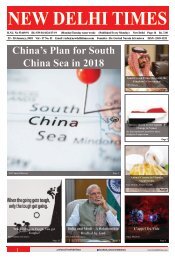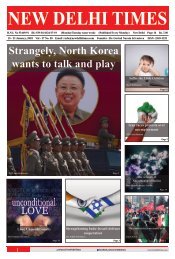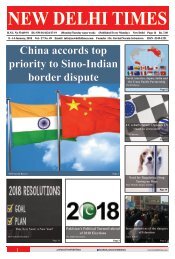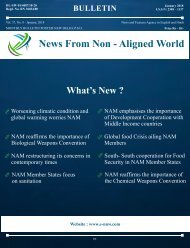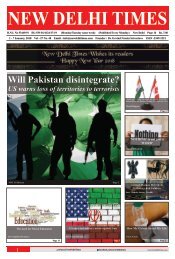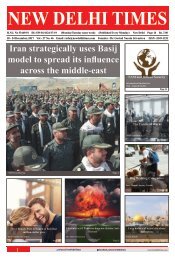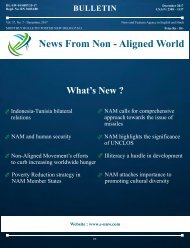10 november 2017_final
Create successful ePaper yourself
Turn your PDF publications into a flip-book with our unique Google optimized e-Paper software.
NAM highlights the need for UN<br />
Peacekeeping reforms<br />
By Dr. Pawan Mathur<br />
Since its inception, the Non-Aligned Movement has<br />
played a significant contribution towards maintaining<br />
international peace and security. NAM regards peacekeeping<br />
as the flagship activity of the United Nations. NAM believes<br />
that the primary responsibility for the maintenance<br />
of international peace and security rests with the UN<br />
and that the role of regional arrangements, in that<br />
regard, should be in accordance with Chapter VIII of<br />
the Charter, and should not in any way substitute the<br />
role of the UN, or circumvent the full application of the<br />
guiding principles of the UN peacekeeping operations.<br />
“At the 17th Meeting of the 72nd Session of the UN<br />
General Assembly on 25 October <strong>2017</strong>, NAM has<br />
called for a more cautious and careful approach<br />
to UN peacekeeping. Non‐Aligned Movement<br />
welcomed the interactive nature of the Department’s<br />
consultations with Member States in the review<br />
process, which would help to reinforce confidence<br />
between the key stakeholders in peace and security,<br />
namely States and members of the Security Council,<br />
and the Secretariat. NAM underlined the creation<br />
of the new Department of Peace Operations, which<br />
was indicative of a big shift from “peacekeeping<br />
operations” to “peace operations”<br />
At the 17th Meeting of the 72nd Session of the UN<br />
General Assembly on 25 October <strong>2017</strong>, NAM has<br />
called for a more cautious and careful approach to UN<br />
peacekeeping. Non‐Aligned Movement welcomed the<br />
interactive nature of the Department’s consultations<br />
with Member States in the review process, which<br />
would help to reinforce confidence between the key<br />
stakeholders in peace and security, namely States and<br />
members of the Security Council, and the Secretariat.<br />
NAM underlined the creation of the new Department of<br />
Peace Operations, which was indicative of a big shift<br />
from “peacekeeping operations” to “peace operations”.<br />
That move should also be examined carefully and<br />
comprehensively to ensure consensus among Member<br />
States on the development of its policies.<br />
NAM has emphasised that the establishment of any<br />
peacekeeping operation, or extension of the mandate of<br />
existing operations, must strictly observe the purposes<br />
and principles of the United Nations Charter, as well<br />
News From Non -Aligned World<br />
as the principles of impartiality, non‐use of force and<br />
consent of the parties. NAM has also stressed the need<br />
for a strong and clear Security Council commitment to<br />
draft clear and achievable mandates, in consultation with<br />
troop and police‐contributing countries as necessary for<br />
the development of integrated planning.<br />
NAM believes that the link between the formulation of<br />
policy and implementation on the ground is paramount<br />
to achieve success of UN peacekeeping mission. The<br />
Movement has also reiterated the importance of<br />
protecting civilians and the need for peacekeeping to<br />
support national civilian‐protection efforts.<br />
At the 72nd UNGA session, Indonesia, associating<br />
the country’s statement with that of Non-Aligned<br />
Movement, stated that <strong>2017</strong> marked a renewed<br />
approach to peacekeeping marked by the concept of<br />
“sustaining peace” and the incorporation of prevention<br />
and conflict‐resolution elements into peace building<br />
and long term development. It was important to ensure<br />
that all missions could deliver on their mandates and<br />
to guarantee the safety and security of peacekeepers,<br />
reaffirming the continued relevance of the basic<br />
principles of peacekeeping, including consent of the<br />
parties, impartiality and non‐use of force except in<br />
self‐defence and defence of the mandate.<br />
Indonesia called for increased consultations with troopand<br />
police‐contributing countries in the current process<br />
of reforming the peace and security architecture.<br />
Operations transitioning from peacekeeping into<br />
political or special political missions required sufficient<br />
capacities and financing, while the United Nations<br />
system must increase its focus on the safety, security<br />
and well‐being of peacekeepers and related civilian<br />
staff. Iran, too associating itself with NAM, stated<br />
that Peacekeeping operations should be guided by<br />
the United Nations Charter, and the respect for the<br />
principles of sovereign equality, political independence,<br />
territorial integrity and non‐intervention in matters of<br />
exclusively domestic jurisdiction.<br />
India, associating with the Non‐Aligned Movement,<br />
noted that whereas decisions on peacekeeping<br />
mandates were within the purview of the Security<br />
Council, longer‐term development issues were dealt<br />
with outside that forum, a situation that presented<br />
(15)<br />
<strong>10</strong> November - 9 December, <strong>2017</strong>


